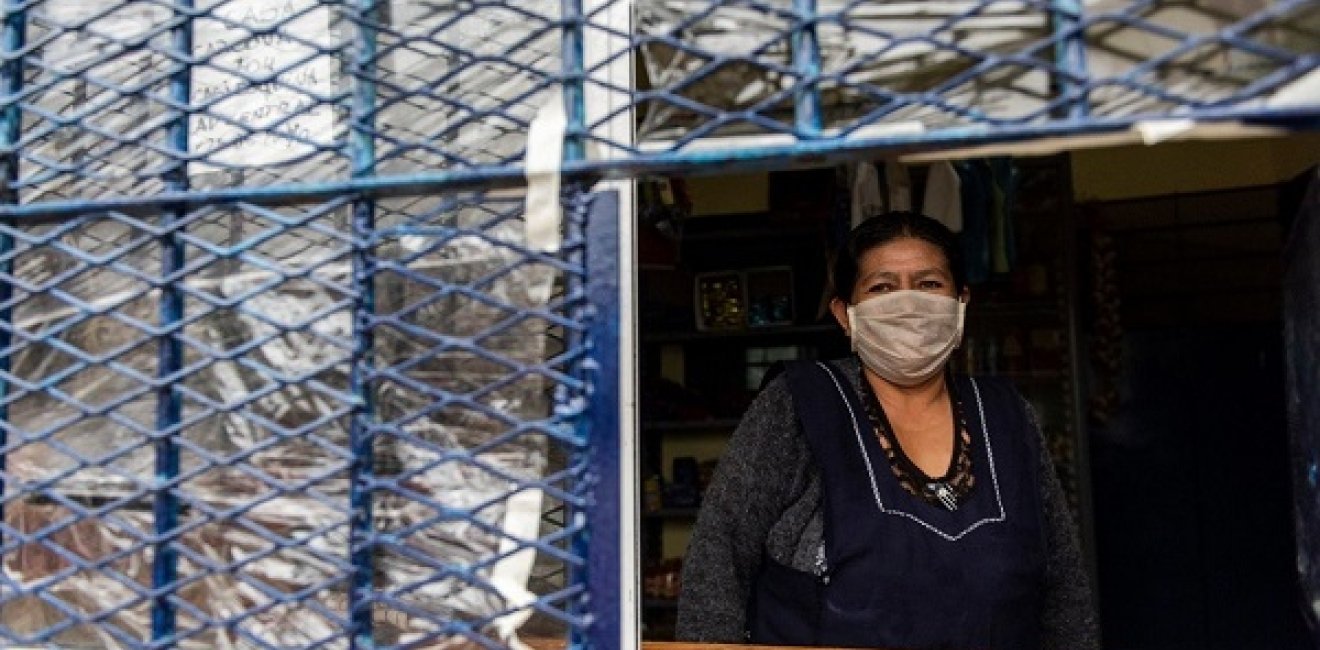
A blog of the Latin America Program
Pandemic of Violence: Protecting Women during COVID-19
COVID-19 is having a profound impact on Latin American women. Gender-based violence increased drastically after governments imposed lockdowns, leaving policymakers and law enforcement scrambling to prevent attacks. Latin America was already one of the most dangerous regions for women, with the highest rate of sexual violence and some of the highest femicide numbers in the world. The Economic Commission for Latin America and the Caribbean registered 3,529 femicides in 2018, or one woman killed every two hours due to her gender. For many women living through the coronavirus pandemic in Latin America, the greater health risk might be staying home.
Calls for Help
In Argentina alone, there were 19 femicides from March 20 to April 20, according to official figures. More recent data, from the Observatorio Ahora Que Si Nos Ven, reported 49 femicides from March 20 to May 10, or approximately one woman killed every 24 hours. In El Salvador, the Human Rights Attorney’s Office reported nine femicides in the first month of the lockdown, and authorities say the actual figure is most likely higher. Indeed, the Organization of Salvadoran Women for Peace recorded 13 cases in the same period. In Mexico, as of April 13, more women had been murdered (367) than had died due to COVID-19 (100) since the country’s first confirmed coronavirus case on February 28. A recent study by the Brazilian Public Security Forum found that femicide in six Brazilian states increased 56 percent in March, compared to the same period last year (from 32 to 50 killings).
The explosion of femicides is tragic, but not surprising. An estimated 7 out of 10 femicides in Latin America occur in a victim’s home, and coronavirus lockdowns have marooned women under the same roof as their abusers. The impact was rapid and dramatic. Several countries saw substantial increases in calls to emergency hotlines following stay-at-home measures. Argentina, for example, has reported a 39 percent spike since March, while Colombia saw a staggering 90 percent rise. Emergency calls to Mexico’s shelters increased by 60 percent. Calls to the military police 190 hotline in São Paulo state increased 45 percent.
Pandemic Policing
As the spike in femicides suggests, the increased outreach to emergency hotlines has not protected women from abuse. In some cases, the calls put women in greater danger, as under lockdown, victims face the risk of being overheard by their abusers. Even those who safely alert authorities, such as through an app or text message, often receive an inadequate response from the authorities. Worse, many women’s shelters, unable to meet social distancing requirements, have closed, leaving women with few options to escape abusive relationships. Moreover, policies often require women to go in person to police stations, courts or other government offices to request a restraining order.
In El Salvador, one of the world’s most dangerous places for women, the strict lockdown measures imposed on March 22 have sharply restricted women’s ability to seek help. Women are allowed by law to leave their homes to report abuse. However, the security services, who are aggressively enforcing the quarantine, appear largely unaware of this special provision, leaving victims at high risk of detention. Like the security services, women might also be unaware of their rights under lockdown; the government has not organized any public service campaigns, and the issue of femicide is drowned out by the pandemic and the country’s chronic gang violence.
In Mexico, insecurity for women is expected to worsen, following President Andrés Manuel López Obrador’s decision to return the National Guard to the streets, after Mexico recorded its deadliest month in March since the start of his presidency. The decision sparked widespread criticism; in the past, the use of the armed forces for domestic security has increased human rights abuses. The country’s National Human Rights Commission has warned of the particular dangers women face, as historically, women have suffered abuse at the hands of troops, who frequently go unpunished. In all, only 7 percent of crimes against women are investigated in Mexico, in part because many women mistrust the authorities and do not file complaints.
That mistrust is amplifying the dangers Mexican women face during the pandemic. Only 11 percent of women attacked during the public health crisis have sought help from the authorities. Those that do call for help are often ignored. In a sign of the rise in violence, Mexico has increased virtual access to emergency services and government agencies. Recently, judges in Mexico City received permission to issue protection orders electronically during the pandemic.
In Brazil, efforts to address violence against women varied widely from state to state even before the pandemic, due to the decentralized nature of law enforcement and limited resources. The patchwork of protections for women is also true today, despite an increasing threat to women. In some states, such as Rio de Janeiro, São Paulo, and the Federal District, police stations are still open 24 hours a day. But elsewhere, police stations, including special precincts for women created by the landmark 2006 Maria da Penha law, are operating under reduced hours. São Paulo and Rio de Janeiro are allowing virtual domestic violence complaints, and São Paulo is allowing judges to grant emergency protective measures virtually, and transmitting summonses through WhatsApp. But a study by the Brazilian Public Security Forum found that the number of emergency protective measures granted in São Paulo had dropped 38 percent during the first two weeks of April compared to the same period last year, even as domestic violence calls to the state’s emergency 190 hotline rose 45 percent. Moreover, many services for victims of violence in Brazil are now more limited. Rio de Janeiro, for example, has suspended operations at its Specialized Centers for Assistance to Women.
Brazil is not the only country in the region that reduced services to women even as violence surged. Calls to Colombia’s domestic violence police hotline surged 225 percent under the lockdown, even as shelters closed. In Argentina, courts do not accept complaints digitally, severely limiting access. Before COVID-19, Argentine courts reviewed approximately 50 gender-based violence complaints a day. Now, they average just five, though hotline calls suggest violence has increased steeply.
Tools at Hand
Not all governments are ignoring the challenge. Expanded access to emergency hotlines, as well as allowing complaints through apps and text messages, and processing virtual emergency protection measures, are helping to address this scourge. Public service campaigns that encourage the reporting of domestic violence – such as Argentina’s #BarbijoRojo social media campaign, and TV ads in Brazil, produced in partnership with UN Women – are also helping alert leaders and law enforcement authorities to the scale of the problem.
In the long-run, the renewed attention to gender-based violence during the pandemic could help ensure women in Latin America live free from fear. For now, however, stay-at-home measures, curtailed limited emergency services and indifferent law enforcement agencies have greatly increased the risks.
Authors

Senior Director, Albright Stonebridge Group



Latin America Program
The Wilson Center’s prestigious Latin America Program provides non-partisan expertise to a broad community of decision makers in the United States and Latin America on critical policy issues facing the Hemisphere. The Program provides insightful and actionable research for policymakers, private sector leaders, journalists, and public intellectuals in the United States and Latin America. To bridge the gap between scholarship and policy action, it fosters new inquiry, sponsors high-level public and private meetings among multiple stakeholders, and explores policy options to improve outcomes for citizens throughout the Americas. Drawing on the Wilson Center’s strength as the nation’s key non-partisan policy forum, the Program serves as a trusted source of analysis and a vital point of contact between the worlds of scholarship and action. Read more


Brazil Institute
The Brazil Institute—the only country-specific policy institution focused on Brazil in Washington—aims to deepen understanding of Brazil’s complex landscape and strengthen relations between Brazilian and US institutions across all sectors. Read more


Mexico Institute
The Mexico Institute seeks to improve understanding, communication, and cooperation between Mexico and the United States by promoting original research, encouraging public discussion, and proposing policy options for enhancing the bilateral relationship. A binational Advisory Board, chaired by Luis Téllez and Earl Anthony Wayne, oversees the work of the Mexico Institute. Read more

Explore More in Weekly Asado
Browse Weekly Asado
Dengue Haunts South America’s Summers

Lessons from Costa Rica’s Economic Transformation

Women and Latin America’s Digital Revolution

